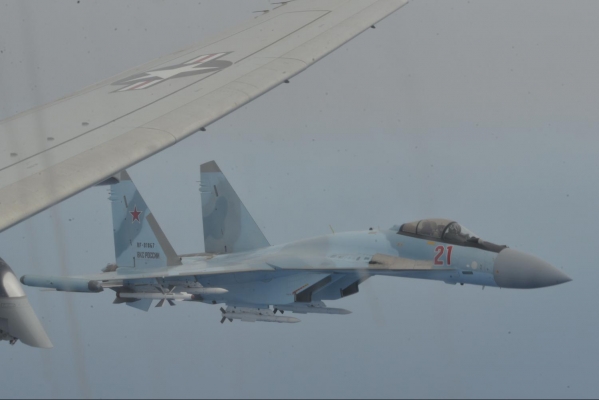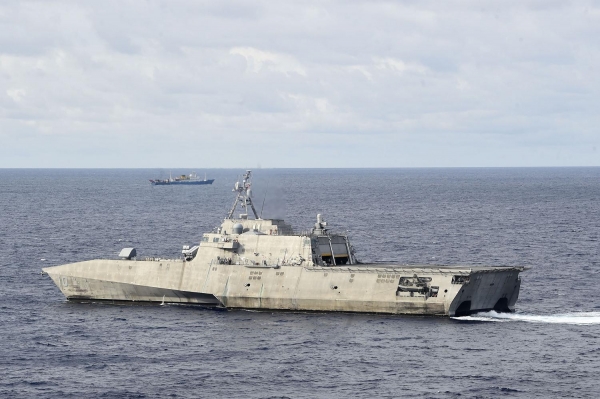 A Russian Su-35 aircraft unsafely intercepts a P-8A Poseidon patrol aircraft assigned to U.S. 6th Fleet over the Mediterranean Sea, May 26, 2020. Officials protested the unsafe and unprofessional behavior of the Russian pilots.
A Russian Su-35 aircraft unsafely intercepts a P-8A Poseidon patrol aircraft assigned to U.S. 6th Fleet over the Mediterranean Sea, May 26, 2020. Officials protested the unsafe and unprofessional behavior of the Russian pilots.
Official Talks DOW Policy Role in Chinese Pacing Threat, Integrated Deterrence
June 2, 2021 | By Jim Garamone , DOW News
Colin Kahl, the undersecretary of defense for policy, explained how his office will flesh out Secretary of Defense Lloyd J. Austin III's wish that "resources must be matched to strategy, strategy matched to policy and policy matched to the will of the American people."
Kahl spoke to an all-hands meeting of the policy office in the Pentagon last week. He spoke about "getting China right," emphasized the importance of integrated deterrence, and called on members of the office to be flexible as they deal with a complicated, messy and often violent world.
The top priority for the department is getting China right, Kahl said. Austin has described China as America's pacing threat, and the undersecretary spelled out what this means to members of the DOW . "It means that China is the only country that can pose a systemic challenge to the United States in the sense of challenging us, economically, technologically, politically and militarily," he said.
Kahl was quick to point out that this does not mean an inevitable spiral into conflict between the U.S. and China. "It does mean that we will have a more competitive and, at times, … adversarial relationship with Beijing," he said.
Kahl emphasized the need to "to get that [relationship] right" in a way that advances our interests, protects our security, enhances our prosperity, preserves our way of life and protects our allies "in the face of a lot of challenges from China across the board."
 The Independence-variant littoral combat ship USS Gabrielle Giffords conducts routine operations in the vicinity of the Chinese vessel Hai Yang Di Zhi 4 Hao in the South China Sea, July 1, 2020. Photo by Petty Officer 2nd Class Class Brenton Poyser
The Independence-variant littoral combat ship USS Gabrielle Giffords conducts routine operations in the vicinity of the Chinese vessel Hai Yang Di Zhi 4 Hao in the South China Sea, July 1, 2020. Photo by Petty Officer 2nd Class Class Brenton Poyser
He also emphasized that the DOW is just one of many U.S. agencies that must "get China right" saying that relations with the nation will require "arguably a whole of society" response. China requires short-term and medium-term policies, for sure, but it also requires agreement on long-term planning, he said. Policies with China must be effective for decades to come.
The U.S. has a powerful position, Kahl said. "My own view is that we win this competition by emphasizing our strengths," he said. "Our strengths as an American society are … the innovative and creative and hardworking spirit of our people."
"Our strengths are our values, because the competition with China is … a competition of systems," he continued. "We have to prove that our government can function and that our democracy is still vibrant. And we need to play to our strengths, which is an unrivaled network of partners and allies around the world. It is the envy of the China's and Russia's and Iran's and North Korea's of the world."
The U.S. must tend to the alliance system and modernize it and cultivate it, and there are roles for policy personnel in the effort.
Kahl spoke of the importance of integrated deterrence. "As we work on the national defense strategy, this concept of integrated deterrence will be a cornerstone of that approach," he said.
Austin envisions this as integrating deterrence across domains of competition and conflict. The military already does a good job with this in the more conventional domains of land, sea and air. But integrated deterrence will include space and cyber domains and the informational world as well. "These are areas, frankly, where our peer competitors are pressing us, and we have hard thinking to do," Kahl said.
 Colin Kahl, undersecretary of defense for policy, speaks at a policy town hall meeting to lay out his priorities in support of the Secretary of Defense’s priorities, May 26, 2021.
Colin Kahl, undersecretary of defense for policy, speaks at a policy town hall meeting to lay out his priorities in support of the Secretary of Defense’s priorities, May 26, 2021.
Integrated deterrence also must be effective across the spectrum of conflict. He said. Russia and China will often operate in the "grey zone" short of conflict. "How do we deter and operate in that environment?" Kahl asked.
Integrated deterrence in this case may include the intelligence and information space. It may require economic actions and diplomatic efforts.
Integrated deterrence will also require allies and partners. "If we are really going to deter countries that are rising as fast as China, or are getting as assertive and aggressive as Russia, we're going to need friends," Kahl said. "We're going to need to integrate them into our understanding of what deterrence means."
U.S. policy personnel cannot take their eyes off the other parts of the world, the undersecretary said. Iran, North Korea and violent extremist groups remain persistent threats. The DOW will have to manage the risks around these threats differently.
"The real challenge is how do you address those persistent threats while managing the risks associated with what you're doing in those other areas," he said.
Republished with permission of DOW . Edited for length.





